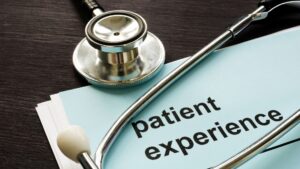By Rose O. Sherman, EdD, RN, NEA-BC, FAAN
Nurse managers increasingly report dissatisfaction with how accountability for the patient experience is viewed in their health systems. Consider the following story an Emergency Department Manager recently reported in a manager focus group:
“ We have had a triage tent in front of my ED for almost two years – that’s how busy we are. It is not unusual for patients to wait up to two days for an admission bed. We are now trying to convert some of our single rooms to doubles to accommodate them. The families and the inpatient staff are angry – no one wants to be in a room with others. By the time the patients and families leave my ED – they seem to have already decided our patient experience is horrible. Just try to turn that around – it is not easy. No one should feel solely responsible for the customer experience – it is all of us, including the C-suite. But increasingly, that is not happening – outside of CNOs and Patient Experience Officers – many executive leaders no longer do leader rounding. I wish they would so they could see how our high patient volumes impact every aspect of care. Nurse managers are given report cards on patient experience scores in their areas. If I were in school right now – mine would be an F, but is that fair?”
Like the manager above, nurse leaders spend more time today in service recovery. Patients and families are angry about a lack of access to care, the fragmentation of communication, and an overall lack of perceived coordination in healthcare. It is impacting patient experience scores. Nurse leaders now tell me that they regularly get calls from the family members of executives and board members who ask to jump the line in EDs and testing areas. One ED manager told me about a board member who brought his son into the ED after a sports injury. “My CEO called and requested- to expedite his care, which I did. He jumped a line of 25 patients waiting to be triaged and many more waiting for radiology tests. He thanked me profusely and raved about the care. I could not help myself – I told him he had not experienced what our patients were experiencing, which was a problem because it colors his perspective as he makes decisions as a board member. He avoided the friction in the system, which others can’t.”
For many months, nurse leaders have been asking me why we are not more honest with the public about what is happening in our healthcare delivery system. Last year, Michael C. Backus, President and Chief Executive Officer of Oswego Health, wrote a candid Op-Ed in his local paper describing what is happening in healthcare as a societal problem. Still, he is among the few willing to acknowledge what most of us know. Meeting the current healthcare demand has become almost impossible.
This brings us back to the patient experience. In the June 2022 edition of Nurse Leader, Lyn Ketelsen RN, an expert in the patient experience, discusses the need for a reset on how we look at the patient experience in a post-COVID environment. For the past two decades, the patient experience has been the focus of everything we do. However, healthcare has changed, and so have the resources available to deliver it. Patient experience metrics impact reimbursement, yet achieving excellent scores in the face of many challenges has become more challenging. Holding nurse managers singularly accountable for what is now a broader systems problem is misguided. We all, including politicians, payers, and regulators, contribute to the patient experience.
© emergingrnleader.com 2024
Brand New Workshop for 2024 – Leading in the New World of Work. Click on Flyer The New World of Work Workshop
Bring the Nurse Leader Coach Workshop to Your Facility Virtually or Onsite. Click Here for the Nurse Leader Coach WS Flyer




 LinkedIn
LinkedIn Instagram
Instagram